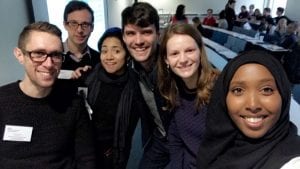HPRU in Blood Borne and Sexually Transmitted Infections
By Nathan Davies, on 5 April 2017
In this post Tom Hartney, a PhD student at PCPH, talks about the Health Protection Research Unit and its recent Academy day.
The Health Protection Research Unit (HPRU) is a collaboration between universities, including University College London and Imperial College London, and Public Health England (PHE). This is part-funded by the National Institute of Health Research (NIHR) in order to promote high quality multi-disciplinary health research. It was set up in 2012, and supports the funding of PhD students to work on projects related to the HPRU’s research objectives.
These students make up the HPRU Academy – this isn’t a university in itself, but instead represents PhD students based across several universities, working in 10 research units each of which focuses on a different health issue (such as emerging infections or environmental hazards) or methodology (such as modelling or evaluation of interventions). This January saw the first HPRU Academy Retreat, which brought together students from across the country to present results from their work and hear about future plans and priorities for the Academy.

Me, second left, and Josina, third left, at the Academy Retreat with our fellow PhD students from the HPRU in Blood Borne and Sexually Transmitted Infections
Myself and Josina Calliste from PCPH attended, both representing the HPRU in Blood Borne and Sexually Transmitted Infections. With 19 students giving oral presentations, as well as talks from academics and PHE staff, over two days, we knew this would be a packed schedule, but it gave us a chance to meet other students working on public health topics, to talk about our projects and find opportunities to work with them in future.
The format was divided into two types of talks, with those from students talking about their work making up the majority of the programme, and each day introduced and ending with talks from HPRU academics on the public health research landscape and aspects of methodology. The student presentations covered a huge breadth of healthcare topics, from the effects of traffic pollution to the risks from ticks in urban areas, with the research opportunities provided by genomic sequencing being a common theme. Given there was so much to cover, students somehow still managed to convey their enthusiasm for their chosen topic and explain their key results while sticking to time.
Professor Bernie Hannigan gave the PHE perspective on the Academy, emphasising its focus on applied research – identifying gaps in the evidence and addressing them with research outputs – as well as the need for researchers to think about how evidence influences public health policy & practice. Dr Satnam Sagoo, PHE’s Head of Education and Training, discussed routes to develop a career in public health, setting out the options available and ways to enhance transferable skills during the PhD process.
Karen Wilding from the University of Liverpool presented on research ethics and governance, a fundamental aspect of every research project. She described the variety of clinical research governance systems and frameworks, as well as the key considerations for ethics, and resources available for help and advice. Finally, Professor Jackie Cassell from Brighton and Sussex Medical School talked about getting patients and the public involved in research. She described ways to implement this at every stage of the lifespan of the doctorate, some of the challenges involved in healthcare research in general, and on transient and stigmatised conditions in particular. Imaginative approaches to public engagement were illustrated these using the example of an exhibition on scabies at the Eastbridge Hospital in Canterbury – originally a medieval hospital for pilgrims – set up in collaboration with the Textile Department of the University of Brighton.
To break things up the Retreat included interactive elements – firstly, in the form of an outbreak response exercise led by Dr Ruth Ruggles, Head of Public Health Training at PHE. Dr Ruggles used data from a real outbreak to put students in the role of public health response teams with crucial decisions to make as the outbreak developed. This culminated in a role played press conference, with volunteers fielding tricky questions from the audience on the media and public reaction to the outbreak. Also, students were able to vote online on their favourite talks and poster presentations, with prizes awarded by Professor Tom Solomon from the University of Liverpool on the final day.
Despite the challenge of packing so much into a two day schedule, the inaugural HPRU Academy retreat provided plenty of food for thought on how to use the expertise available within the Academy – here’s looking forward to next year’s event.
 Close
Close

